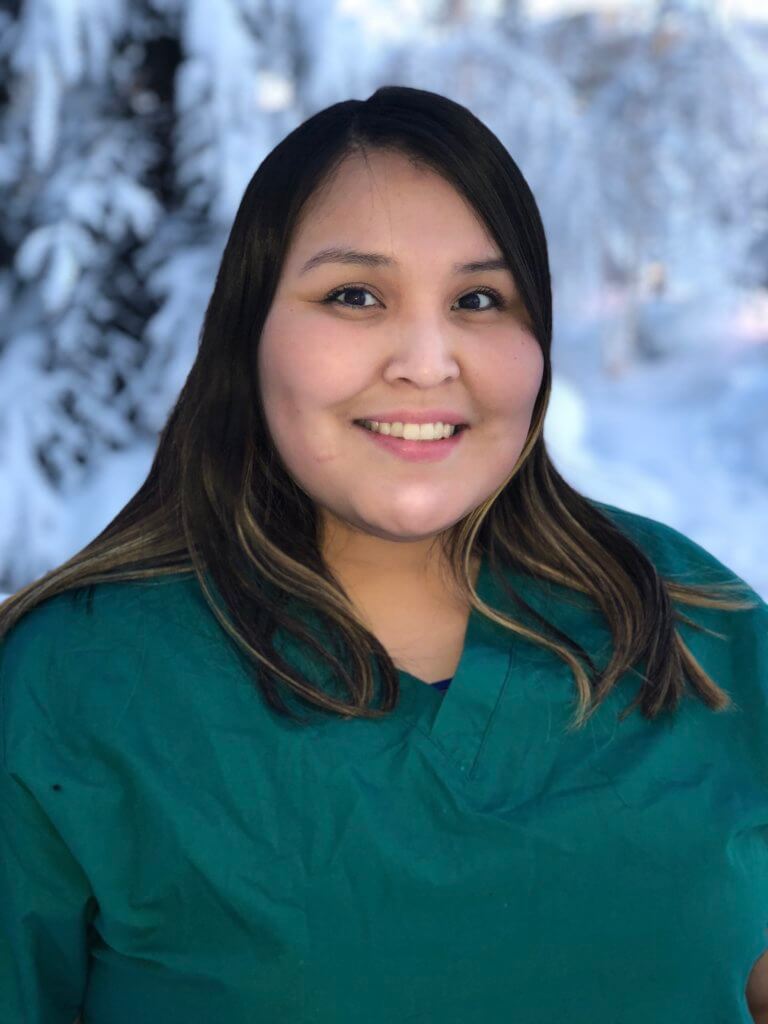
When you see the TV coverage of how the Corona virus is overwhelming the U.S. health care system, the stories are about hospitals. Dressed in gear that looks like it was designed for space travel, the front line workers talk about how physically and emotionally exhausted they are, how they long for a return to normalcy. It is easy to forget that we have rural Alaskan medical providers also straining to deal with the virus on top of their normal workloads, and that many of them are working alone, without the support of on-site colleagues or sufficient time off to recharge. People like Shanice Albert, the health aide in Northway.
Born and raised in this community of under 300 people, Shanice has been a health aide for almost five years. “My late grandmother Maryann Albert, was a Certified Nurse Assistant and when I was a kid, I was always messing around with things like her stethoscope, pretending to do her job. I didn’t exactly intend to follow in her footsteps, I didn’t really think I was qualified for such an important job. But my cousin saw the job advertisement and encouraged me to apply; I was amazed when they hired me!”
The initial steps to becoming a health aide were even harder than Shanice had imagined. She had to leave her home and family for weeks at a time to go to Fairbanks for classes, she had to share a room with a fellow student who was a stranger to her, and after a day of sitting through lectures and demonstrations she often stayed up until midnight or later reading and memorizing the information. There were times when she wanted to just leave it all and go home, but by focusing on each day instead of how much there was still to do and learn in front of her, Shanice made it through the rigorous training and eventually went back home to Northway.
“At first I was a nervous wreck. Not just doing the medical part of the job, but here I was asking personal questions and examining the community members I was raised with. It was so awkward sometimes, but eventually I grew into being more professional and now it is just my job and I try to do it with compassion and no judgment.”
Even after years of doing the work, parts of the job remain wrenching. “It is very hard to see people in pain, especially the elders. Sometimes they are so ill that I have to arrange a medivac, with the assistance from Northway EMS Pamela Baker-Albert, for them to be sent to the hospital. In those cases, I have to force myself not to become emotional, because I know it is going to be hard for them to be away from home, being treated by strangers in an overwhelming large hospital.”
“The virus has made things worse. More sick people, having to put on special suits and shields when tending to a COVID patient, and more testing of people with some of them getting upset when the results are not back fast enough. And then over the last nine months the guidelines for how to protect yourself have changed, as scientists have learned more. There are times that people get mad at the different information and protections I talk about, because it seems arbitrary to them and each time the rules get stricter.” The virus outbreak in Northway did not spare Shanice, who caught the virus and had to stay away from her job for almost an entire month while she recovered. “That was almost harder, knowing people needed me and there was nothing I could do but stay home.”
Shanice has been the only health aide since March, except for the few times an itinerant worker has been able to come into the village for a week to help. She has terrific phone support from her supervisor and knows she can contact other health aides if she needs to vent, but in the end, she alone is there for her village. This means she is on call around the clock, and since there is no cell coverage in this part of the state, she is forced to stay home to be near her landline. People also know that if she is not there, she is usually at her mom’s house, “bugging her to teach me more about beading. She is very skilled and I am just learning.”
As the mother of two boys, nine and ten, Shanice does not have a lot of free time, but when she is not doing mom-related activities or beading, she works with her aunt Lorraine Titus to write out the traditional Native songs so that they will not be lost to future generations. “I am pretty good at my language and writing it, just not the talking part, and I get satisfaction out of knowing I am helping to pass on our traditional songs. I also am in our native dance group, but it has been canceled since COVID-19 hit us…right now we are all just waiting for life to get back to normal.”
